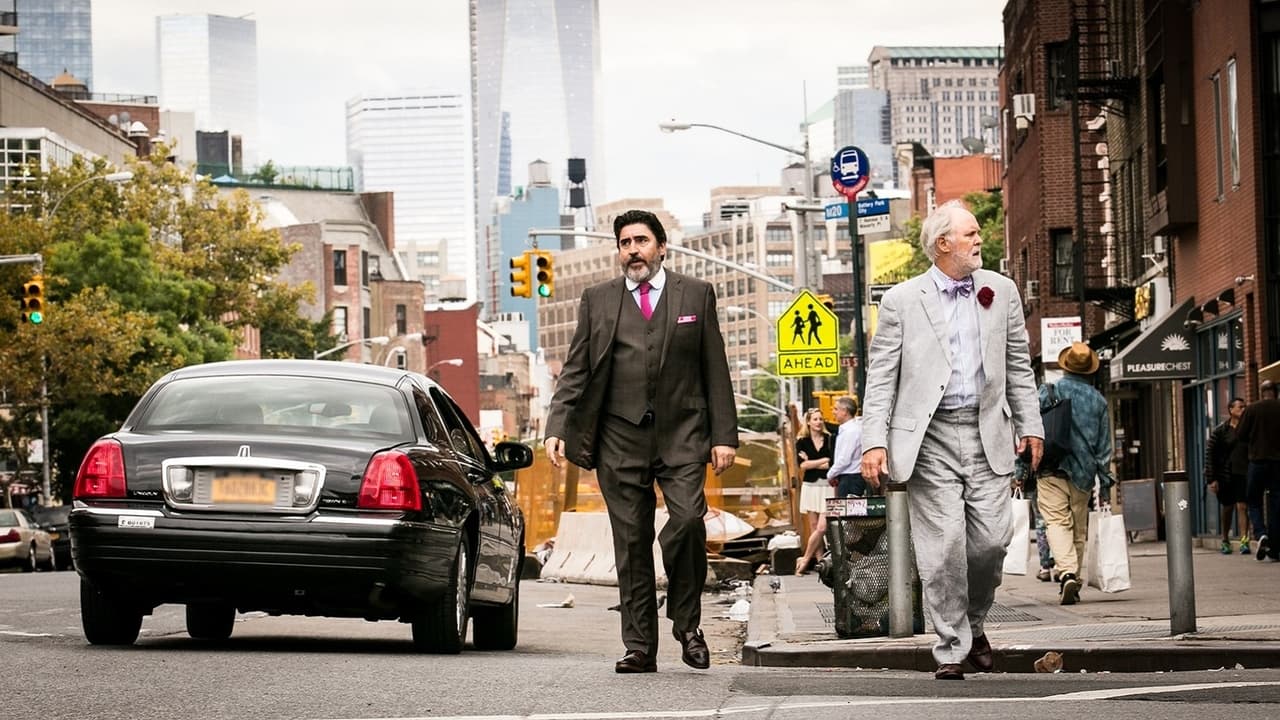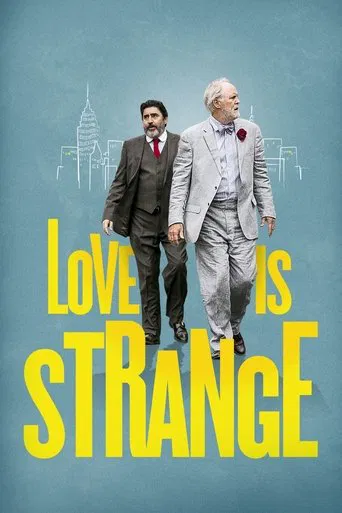

On rewatching writer-director Ira Sachs' touching, perfectly-formed, 2014 low-key drama, it struck me that one of the most thought-provoking things about the film is the multi-dimensional potential of its title. Not only does Sachs' choice to portray the deep affection felt between two ageing homosexuals set his drama apart (even now) from the mainstream of Hollywood films, but a relationship longevity of 39 years is an equally rare thing it seems these days. Most pivotally for Sachs' narrative, though, is the fact that the choice made by Alfred Molina's Catholic school music teacher, George, and John Lithgow's artist, Ben, to seal the marital knot on their obviously loving relationship provokes the powers that be to sack George from his job, thereby forcing the couple to sell their New York apartment and to take up offers of (hopefully temporary) accommodation with family and neighbours, in the process necessitating the pair's physical separation. What follows is a perfectly judged, naturalistic drama, full of moments of poignancy and wry humour, perceptively co-written by Sachs and Mauricio Zacharias, and touching on themes of family dysfunction, intergenerational difference, guilt and regret, in which we really feel for George and Ben as seemingly helpless victims of unfair circumstance. Sachs' observational touch is particularly adept around the intergenerational angle, for which, amongst an all-round superlative cast, Marisa Tomei's niece to Ben, Kate, and her son, Charlie Tahan's Joey are outstanding. The film's subtle, poetic qualities are also enhanced by the choice of some sublime Chopin piano music, whilst Christos Voudouris' cinematography, though generally unfussy, also gives us some memorable sunsets of the New York skyline. The film's narrative arc and its take on the bittersweet nature of fate and fortune also culminates in one of the most strikingly uplifting closing sequences that I can recall anywhere, providing us with a final dimension and take on Sachs' film title.
... View MoreIt is not the best film I ever saw. And of course, this is a matter of subjectivity whether what I see is a best or a worst but quality is quality and a good story is what makes a good movie most of the time. But I know I cried and I laughed with the story. I know I felt things that not often I was to feel watching a movie. I felt like I was reading a very good book with strong characters, a story with simple but real plots. A story that makes the mind floating along with and taking me to this journey that I felt I need to see the end of. And then again, the story was not strong. My guess is that the characters make the story. The characters took me alongside the story, with them through the entire movie. So... what makes this movie not so good in the end? This is something to be answered and discovered and discussed... and not something to exist as a criticism because if I felt joy and sadness watching this movie that means that, as it is, bad or good... this movie gives us an experience not many movies has to give. I say 'not many' because I don't know if there is another movie out there to deliver what this movie delivers. I tend to think that it might be the only movie to give such a fine experience of love, truth and music. Ten starts for not such a good movie; that is for the use of music.I know this much: if a movie combines the language of music in fine quality with the images then that is a movie to be seen.
... View MoreFor most, your wedding day is usually the happiest day of your life. It is where you tell the world in front of your friends, family, and God that you are committing to sharing your life with that special someone until you are no more. But for Ben (John Lithgow) and George (Alfred Molina), a gay couple who have been together for 39 years, are finally getting hitched in New York City. I wouldn't go as far as to say this is the happiest day of their lives, since we can already see in the opening minutes of the film that they have both led very happy lives together in their great Manhattan apartment, as they are getting ready like any other normal day for their wedding ceremony.Getting dressed, showering, fixing their bow ties, running late, and failing to find a cab to take them to their big event, Ben and George seem to have been through it all, and have taken each obstacle with grace and laughter. But when the two of them are separated physically right after their wedding day due to reasons beyond their control, indie director Ira Sachs ('Forty Shades of Blue') gives us an intimate glimpse into the human relationships through hardships so late in life.After their wedding, they have a small party at their apartment, which looks like any number of parties they might have thrown over the years complete with good food, good alcohol, singing and dancing. Their small wedding party includes Ben's nephew Elliot (Darren Burrows), a too busy for his own family businessman, his wife Kate (Marisa Tomei), a successful novelist who works from home, their teenage son Joey (Charlie Tahan), and two gay party-hopping police officers Roberto (Manny Perez) and Ted (Cheyenne Jackson), who live together in the newlywed's building.Unfortunately, the news of their marriage reaches the New York archdiocese, and George (a long time Catholic School music teacher) is fired from his job, forcing Ben and George to sell their apartment. When finding a new place is more difficult than originally anticipated, they graciously ask their friends and family for a roof over their heads. While Ben heads to his nephew's Elliot's house to share a bunk bed with their teenage son, George takes up the couch with hard partying Roberto and Ted.Sachs and his co-writer Mauricio Zacharias give us a very tender and realistic account of these two lovers in their later years, who are struggling to keep their happiness and find a way to physically be with each other again. Their script will bring up memories from any of your past relationships that are not only funny, but very charming and sweet, for example when the two men are in a historic gay bar, and talk about their younger lives together and all the trouble they used to get in as they looked over the younger crowd. And Sachs's camera-work is corresponding to Woody Allen's earlier work when i liked filming in New York. In a way, this is also Sachs's love memoir to the Big Apple as it too plays a character in the film.Molina and Lithgow deserve awards for their performances here. They really fall into their roles and make us believe that they have been together for four decades. Their eyes and body language really sell their love for one another, and has an infectious spell that hovers over the people they stay with. With the excellent script and the endearing performances from these aging actors, mixed with the classical score, 'Love is Strange' is one of those magical films you don't want to miss.
... View MoreKevin's review of Love is Strange is overly critical and I wonder why it drips with anger about a movie, which while flawed in some parts, is overall a considered, well-acted and beautifully photographed piece of cinema. For once not only is it a delight to see positive representations of older people on the screen but it's refreshing to see the depiction of 2 older gay men in a celebrated way. Often older gay men and lesbians are absent not only in cinema but also in their respective communities, which seem obsessed with youthfulness. And if you don't understand why Uncle Ben's grand nephew, Joey, is crying towards the end then you've missed a key part of the movie, which in a mainstream Hollywood movie would be milked for every emotion from the audience. Here it is marked with subtlety. Rather than continue responding to Kevin's misrepresentation of the movie and lack of insight, let me express my own thoughts. Ben and George are older gay men who have been married for 39 years. They live comfortably in a New York apartment; Ben drawing a pension and painting and George teaching music at a local Catholic school. There trusting intimacy with each other comes from a long-term relationship which has weathered storms but remained honest. This is borne out several times during the movie and notably in a bar when they're having drinks together. In the opening moments of the movie they marry and celebrate with family and close friends. When George returns to school after the term break the headmaster, Father Raymond, dismisses George for his public declaration of his sexuality, even though the school community has been aware of George's relationship for the entirety of his employment (13 years). As a result, Ben and George can no longer afford to continue buying the apartment they're living in. They move out while they look for alternative accommodation thinking that it will be only a short time before they find somewhere. Consequently, they ask friends and family to accommodate them in the short-term; they agree and are more than willing to help out. Ben's niece, who lives upstate, assumes that it's her place to accommodate them because she has the room. However, the other friends and family, knowing George and Ben are urban Manhattanites and would hate a rural lifestyle, insist they should remain in the city, which they love and know. Consequently George is accommodated by the 2 gay cops in the downstairs apartment and Ben stays with his nephew and his partner and their son and bunks in with the son in his bedroom. The accommodation is hardly satisfactory for these 2 seniors; George sleeps on a couch but only when the 2 gay cops finish there entertaining after their shifts. The movie focuses on the relationships in the home of Ben's nephew and the difficulties experienced by Ben and George living apart in residences with vastly different house rules. Ben and George find it difficult to find accommodation and George discovers for various reasons that after they move from their apartment, the amount of money left over is miniscule because of taxes etc. Eventually, at a party, George bumps into Ian, an Englishman, who is about to move out of his apartment and this is where the breakthrough occurs in resolving Ben and Georges accommodation problems. But is it too late? This movie is well crafted and beautifully acted not only by the 2 main characters Alfred Molina and John Lithgow but most of the supporting cast. It's a movie that suggests that the rights of gay men and lesbians haven't necessarily been addressed by the right for them to legally marry. In fact, it is clear that gay men and lesbians still have a long way to go to attain equal rights in some sections of society. It is a considered story that is lightly accessorised with moving music throughout and nothing more. The camera work captures New York City in the most amazing light at times and clearly demonstrates the reasons why Ben and George are at home here and love it so much. I was moved by this movie in a number of ways and most of the audience in the cinema seemed to be affected the same way. Hardly any left until the last credits had rolled, a rarity in most cinemas these days. I highly recommend this movie; go and see it and be pleasantly surprised!
... View More